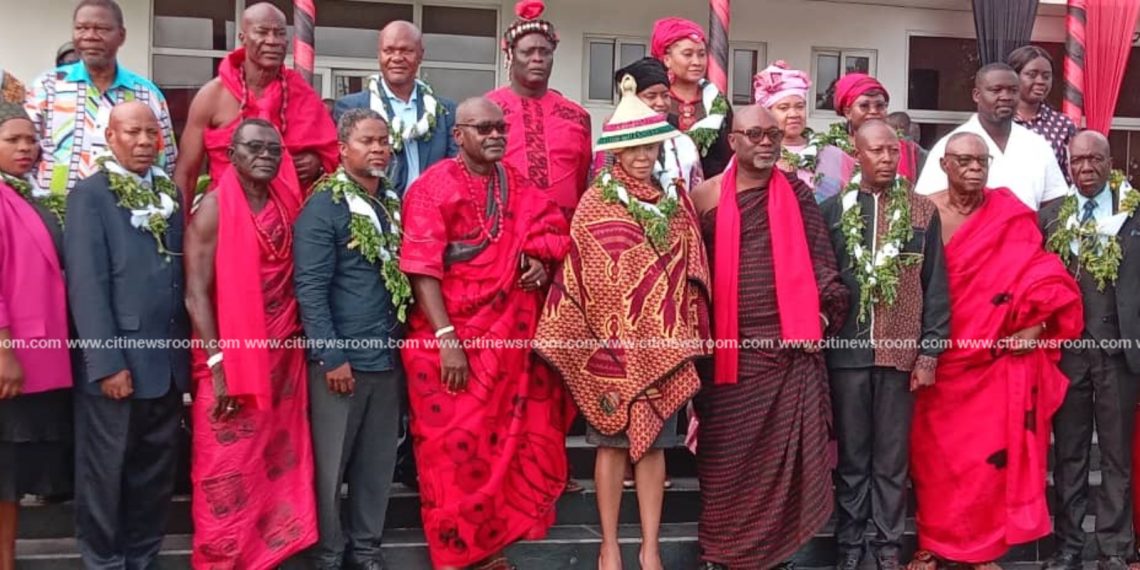|
Getting your Trinity Audio player ready...
|
A former Justice of the Supreme Court, William Atuguba has criticized the apex court for the way and manner it handled the case of Assin North Member of Parliament James Gyakye Quayson.
To him, the Supreme Court does not stand in a good light in disqualifying Gyakye Quayson despite his certificate of renunciation of his Canadian Citizenship as of 26th November 2020.
The Supreme Court had declared James Gyakye Quayson’s election as a lawmaker for Assin North in the Central Region as unconstitutional.
In a unanimous decision Wednesday, May 17, 2023, a seven-member panel of the Supreme Court ordered Parliament to expunge the name of Mr. Quayson as MP.
It was the considered view of the court that the election of Mr. Quayson breached Article 94(2) (a) of the 1992 Constitution because at the time he filed to contest the elections he was not qualified to be elected as a legislator since he had not renounced his dual citizenship.
The court therefore declared Mr. Quayson filing to contest, the EC’s decision to allow him to contest as well as his swearing-in as MP in Parliament as all unconstitutional, null, and void.
He however contested in the by-election held in the same constituency on Tuesday, June 27, and won.
Delivering a public lecture in Accra on Tuesday, October 24, Mr. Atuguba said “The James Gyakye Quayson’s decision by the Supreme Court is with all due respect scandalous in that the court, in the teeth of the settled maxim Res Judicata et non quieta movere, re adjudicated the same matter that has been adjudicated upon by the High court on the merits. All that was left was its execution according to court processes. Again, the stress laid by the court on the statutory processes for acquisition and renunciation of citizenship shot itself in the foot. If the certificate of renunciation is so mandatory and conclusive, why was it not conclusive in its effect to qualify Gyakye Quason when he received it, dated 26th November 2020, whereas the parliamentary election was held on 7th December 2020? Statutes, judgements, and documents must always be applied with consistency both in the letter and spirit.
“These must always be construed holistically and as instruments of justice since it is a well settled principle that the duty of a court is to do justice and a court should not be turned away from doing justice. In the 2013 presidential election petition (2013) SCGLR (Special Edition) 73 at 141 I stated as follows: ‘Again in Osman v Tedam (1970) 2 G & G 1246 (2d) CA and Osman v Kaleo (1970) 2 G&G 1380, the Court of Appeal held that though the respondents were members of the Convention Peoples Party whose constitution made all Members of Parliament of the Convention Peoples Party members of the party’s Regional Executive Committee that did not without more, make the respondents members of such committees and therefore disqualified to contest the 1969 Parliamentary Elections, which they had won.”
He added “The decision in Osman v Kaleo is even more striking. Though the respondent had secured exemption from disqualification from contesting the parliamentary elections, it was submitted that since his exemption had not been published in the Gazzeet, upon which publication it will have effect, under paragraph 3 (5) of NLCD 223, 1968, the same was inoperative, notwithstanding that under paragraph 3(7) of that Decree, the decision of the Exemptions Commission was final and conclusive. The court of Appeal rejected that contention”.
“Again, in JUSTICE DERY v TIGER EYE PI AND OTHERS (2015-2016) 2 SCGLR 816, the Supreme Court unanimously held that though the impeachment process against the plaintiff was published in contravention of Article 146 of the 1992 Constitution that could not vitiate the crucial impeachment procedures against him. In other words, the substantial and more important provisions on the removal of a corrupt judge could not be diverted by the incidence of the unconstitutional publication of the impeachment petition.
“Similarly, then the certificate of Renunciation dated the 26th November 2020 was more important than the anterior participation by Gyakye Quayson in the parliamentary campaigns between 5th and 9th October 2020 when he filled his parliamentary nomination papers with the electoral commission. The Supreme Court does not stand in good light, with all due respect in disqualifying Gyakye Quayson despite his clear certificate of Renunciation of his Canadian Citizenship as from 26th November 2020. By analogy also, in CLOSSAG v ATTORNEY GENERAL AND 2 OTHERS (2017 -2018) 1SCGLR 210, the Supreme Court unanimously held that a member of the Civil Service or Local Government Service can join a political party but cannot actively participate in politics or hold office as a political party nominee or remain in the Civil Service after election as a member of the District Assembly. In other words, the operative evil to guard against is membership of the District Assembly not the contest for the same. Similarly, therefore, the operative evil to guard against about a dual citizen is, as regards parliament, his actual membership of it, not just the campaigns.
“That is why in the Gyakye Quayson’s case, his renunciation of Canadian citizenship certificate dated 26th November 2020 is the operative consideration. In any case it will be noticed that his certificate of citizenship is tied to an Oath pf allegiance. The 2 move together, the letter and the spirit. It is difficult to think that Gyakye Quayson who submitted his Renunciation of Citizenship Papers to Canada in 2019 could still in December 2020 be held as seriously owing allegiance as a matter of hard realism as opposed to formalism, to Canada. In the King David example, I cited in Asare V Attorney General (2012), 1 SCGLR 460, his Israelite citizenship became of real concern to the Philistines when going into actual war with Israel.”
Credit: 3news.com





